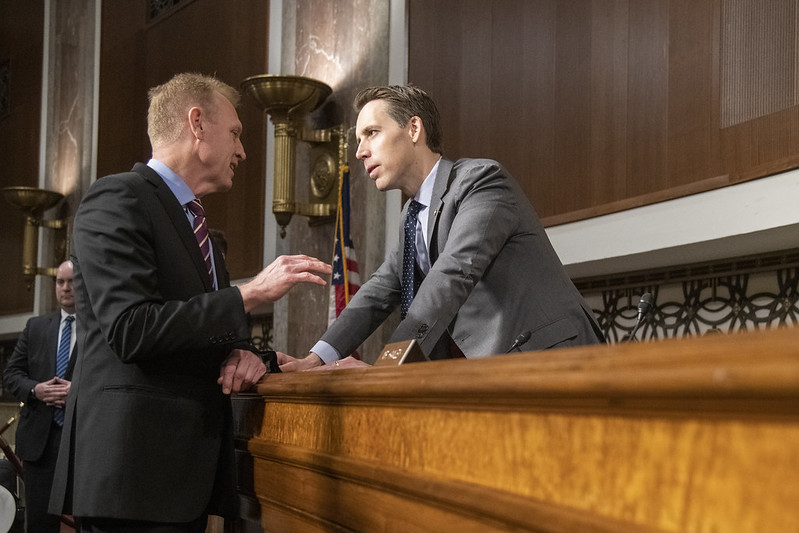Lawyers appeal decision to clear Missouri Sen. Josh Hawley on election ethics complaint
A group of lawyers who claimed Missouri Sen. Josh Hawley had committed ethics violations in connection with his challenges to the 2020 presidential election is appealing the rejection of their complaint by the Missouri Supreme Court’s chief disciplinary counsel.
The appeal, which has not been previously reported, was with the Missouri Supreme Court’s advisory committee Sept. 9. It was signed by Alan B. Hoffman, a retired St. Louis attorney, and 17 others, most of them St. Louis lawyers but a few of them current or former Democratic Party politicians, including former St. Louis Mayor Vincent Schoemehl Jr.
Although it was not reported at the time, Alan Pratzel, the chief disciplinary counsel, informed the group in a letter on Aug. 16 that he had rejected their initial complaint, which had been filed Feb. 26, 2021 — nearly 18 months earlier. It accused Hawley of making statements concerning the election that “were false and known by Senator Hawley to be false at the time made or were made with reckless disregard for truth or falsity.”
Chief among those statements was a tweet Hawley posted on Dec. 30, 2000, alleging that “some states, particularly Pennsylvania, failed to follow their own state election laws” and that there had been an “unprecedented effort of mega corporations, including Facebook and Twitter, to interfere in the election.” Hawley used the same language in a press release he posted on his web site the same day.
Hawley made these allegations, the complaint said, despite “the fact that no evidence of irregularity or impropriety in the conduct of any State election was offered in any judicial or administrative proceeding, that every court which considered these matters found no evidence of any such irregularity or impropriety, and that no such evidence in fact exists.”
The complaint also took of Hawley’s fist-pump to the crowd outside the capitol just before the attack Jan. 6, a “salute” that had the effect of “encouraging the lawlessness and violence which ensued.”
In these and other acts, the four-page complaint said, Hawley violated the oaths he took as a Senator to uphold the U.S. and Missouri constitutions and to practice law in Missouri. Among other examples of such violations, the complaint quoted the preamble to Missouri Supreme Court Rule 4-3.1, which states, “A lawyer shall not bring or defend a proceeding, or assert or controvert an issue therein, unless there is a basis in law and fact for doing so that is not frivolous …”
But in his Aug. 16 letter, Pratzel rejected the complaint in a single paragraph.
“We found insufficient probable cause,” the letter said, “to believe that Senator Hawley was guilty of professional misconduct that would justify discipline regarding his conduct leading up to and following the Presidential election on November 3, 2020, including the events at the Capitol on Jan. 6, 2021. Specifically, the OCDC found that the public statements made by Mr. Hawley regarding the Presidential election, whether made on the Senate floor or in other public and media venues, were constitutionally protected. The OCDC also concluded, based on the location and timing of Mr. Hawley’s ‘fist-pump’ at the Capitol on January 6, 2021, that there is insufficient evidence to establish a violation of the Rules of Professional Conduct.”
In its appeal, the group challenging Hawley noted that Pratzel failed to offer any “analysis of the facts or applicable law … to support these conclusions.” But it appeared from the context of Pratzel’s comments, the group wrote, that he based his position on the “Speech or Debate” clause of the U.S. Constitution.
That clause, which was written before the First Amendment, protects members of Congress from being “questioned in any other place” for speech they make in Congress in connection with their legislative activities.
In their appeal, Hoffman and the others wrote that they had anticipated that defense, and “made clear that the Complaint does not address any statements made by Senator Hawley in his legislative capacity …”
“The question presented, therefore, is whether the conduct complained of was protected legislative activity,” the appeal continued. “The answer is no.”
In U.S. v. Brewster, the group wrote, the Supreme Court in 1972 ruled that “news releases and speeches delivered outside of Congress” by members of Congress “are political in nature rather than legislative,” … and therefore lack “the protection afforded by the Speech or Debate Clause.”
The conduct by Hawley that sparked their complaint, the appeal noted, “was clearly ‘political in nature rather than legislative.’ In the digital age, a Senator’s website is the contemporary medium for news releases. Such was certainly true of Senator Hawley’s Dec. 30, 2020 statements on his web site. And his gesture of encouragement to the already inflamed mob on January 6, 2021 was the functional equivalent of ‘a speech delivered outside of Congress.’ Both were political acts, even if they could be considered related to legislative activities and were not protected by the Speech or Debate clause of the Constitution.”
Finally, the appeal noted that Hawley continues to use the photograph of him raising his fist to the mob for fundraising. “No clearer evidence of the political, rather than legislative character of Senator Hawley’s conduct could exist,” it said.
In an email to the other signatories of the complaint, Hoffman also said that Sen. Lindsey Graham (S.C., Rep.) had used the Speech or Debate clause to resist a subpoena to testify in the Fulton County, Georgia investigation of the election. But U.S. District Court Judge Leigh Martin May rejected the argument, Hoffman wrote.
Mike Wolff, a former chief justice of the Missouri Supreme Court who was not involved in the complaint or the appeal, offered this perspective:
Pratzel, he said, is a straight shooter. But to maintain his effectiveness with the Court, Pratzel has to have a sense for what cases can be won, and Pratzel may believe the Court would be more interested in guarding free speech by members of Congress than punishing what Wolff called Hawley’s “nonsense.”
“It’s not a crime to lie to the public, but it is a crime and ethical offense to lie in court,” Wolff said. “Apparently it’s not a crime to lie on the floor of the Congress either.”
The Missouri Supreme Court Advisory Committee, to which the complainants have appealed, is appointed by the Missouri Supreme Court. If the committee finds a “substantial need for further investigation or analysis,” it can assign the Complaint to a regional disciplinary committee that was not involved in the original investigation, according to a Supreme Court rule.
The committee currently has 12 members, according to the committee website. They are Dorothy White-Coleman, chair, St. Louis; Edward C. Clausen, vice chair, Jefferson City; David W. Ansley, Springfield; Sheryl Butler, St. Louis; Keith A. Cutler, Kansas City; Jill A. Kanatzar, Kansas City; Levell D. Littleton, Clayton; Elizabeth D. McCarter, St. Louis; Dan R. Nelson, Springfield; Dale Siebeneck, Jefferson City; Kirby Upjohn, Kansas City; and Branson L. Wood III, Hannibal. The committee’s legal ethics counsel, who serves as the committee’s counsel and staff, is Melinda J. Bentley.
Paul Wagman is a former Post-Dispatch reporter and FleishmanHillard executive who is now an independent reporter, editor and communications consultant. He wrote an investigative report earlier this year for GJR on the involvement of St. Louis Republican officials in the election denial myth.


